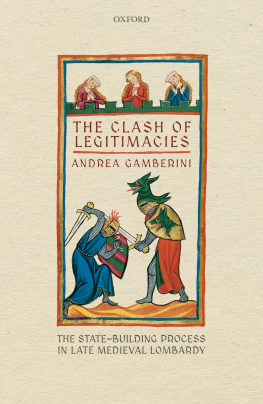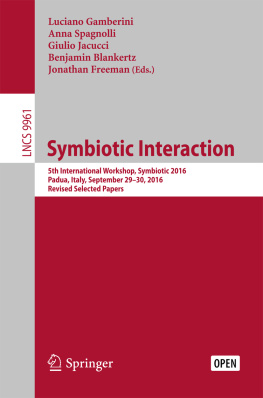Andrea Gamberini - The Clash of Legitimacies
Here you can read online Andrea Gamberini - The Clash of Legitimacies full text of the book (entire story) in english for free. Download pdf and epub, get meaning, cover and reviews about this ebook. year: 0, genre: Politics. Description of the work, (preface) as well as reviews are available. Best literature library LitArk.com created for fans of good reading and offers a wide selection of genres:
Romance novel
Science fiction
Adventure
Detective
Science
History
Home and family
Prose
Art
Politics
Computer
Non-fiction
Religion
Business
Children
Humor
Choose a favorite category and find really read worthwhile books. Enjoy immersion in the world of imagination, feel the emotions of the characters or learn something new for yourself, make an fascinating discovery.
- Book:The Clash of Legitimacies
- Author:
- Genre:
- Year:0
- Rating:4 / 5
- Favourites:Add to favourites
- Your mark:
- 80
- 1
- 2
- 3
- 4
- 5
The Clash of Legitimacies: summary, description and annotation
We offer to read an annotation, description, summary or preface (depends on what the author of the book "The Clash of Legitimacies" wrote himself). If you haven't found the necessary information about the book — write in the comments, we will try to find it.
The Clash of Legitimacies — read online for free the complete book (whole text) full work
Below is the text of the book, divided by pages. System saving the place of the last page read, allows you to conveniently read the book "The Clash of Legitimacies" online for free, without having to search again every time where you left off. Put a bookmark, and you can go to the page where you finished reading at any time.
Font size:
Interval:
Bookmark:

European History
General Editors
john h. arnold patrick j. geary
and
john watts

Great Clarendon Street, Oxford, OX2 6DP, United Kingdom
Oxford University Press is a department of the University of Oxford. It furthers the Universitys objective of excellence in research, scholarship, and education by publishing worldwide. Oxford is a registered trade mark of Oxford University Press in the UK and in certain other countries
Andrea Gamberini 2018
The moral rights of the author have been asserted
First Edition published in 2018
Impression: 1
All rights reserved. No part of this publication may be reproduced, stored in a retrieval system, or transmitted, in any form or by any means, without the prior permission in writing of Oxford University Press, or as expressly permitted by law, by licence or under terms agreed with the appropriate reprographics rights organization. Enquiries concerning reproduction outside the scope of the above should be sent to the Rights Department, Oxford University Press, at the address above
You must not circulate this work in any other form and you must impose this same condition on any acquirer
Published in the United States of America by Oxford University Press 198 Madison Avenue, New York, NY 10016, United States of America
British Library Cataloguing in Publication Data
Data available
Library of Congress Control Number: 2018937076
ISBN 9780198824312
ebook ISBN 9780192557605
Printed and bound by CPI Group (UK) Ltd, Croydon, CR0 4YY
Links to third party websites are provided by Oxford in good faith and for information only. Oxford disclaims any responsibility for the materials contained in any third party website referenced in this work.
The present text is the translation, appropriately revised, of a book published in Italy by Viella Libreria Editrice in 2016 under the title La legittimit contesa. Costruzione statale e culture politiche (Lombardia, XIIXV secolo). It is through the graciousness of John Watts, with whom I share an interest in political cultures and whose studies I warmly admire, that I received the invitation to publish a new version with Oxford University Press. I would like to thank Stuart Wilson, my cordial and accommodating translator, for providing an English version. A special thanks goes out to Julius Kirshner who, with immense generosity, made himself available to read over the English text.
Conceived originally for an Italian audience, the work is now being presented to an international audience. This has involved a certain amount of adaptation of the text, integrating and clarifying where necessary, so that it would be more accessible to a reader with no great experience in Italian history. The passages in Latin or Italian vernacular have also been translated into English, with the original texts in brackets or in footnotes. The addition of maps and certain images not included in the Italian edition should further contribute to the clarity of the content. One last word regarding lexis: to avoid ambiguity, I have adopted the term signoria to refer to urban proto-princely regimes; the term seigneurial, in turn, refers mainly to rural lordships.
A.G.
Milan
October 2017
Milan, Archivio di Stato
Reggio Emilia, Archivio di Stato
Dizionario Biografico degli Italiani, Rome 1961
Rerum Italicarum Scriptores, ed. L. A. Muratori, Milan 172351
Rerum Italicarum Scriptores. Raccolta degli storici italiani dal cinquecento al millecinquecento ordinata da L. A. Muratori. Nuova edizione riveduta, ampliata e corretta, ed. G. Carducci and V. Fiorini, Citt di Castello 1900
| Ottone Visconti | 12771287 |
| Matteo Visconti | 12871302 |
| Guido della Torre | 13021311 |
| Matteo Visconti | 13111321 |
| Galeazzo I Visconti | 13221327 |
| Azzone Visconti | 13291339 |
| Luchino and Giovanni Visconti | 13391349 |
| Giovanni Visconti | 13491354 |
| Matteo, Galeazzo II and Bernab Visconti | 13541355 |
| Galeazzo II and Bernab Visconti | 13551378 |
| Bernab and Gian Galeazzo Visconti | 13781385 |
| Gian Galeazzo Visconti | 13851402 |
| Giovanni Maria Visconti | 14021412 |
| Filippo Maria Visconti | 14121447 |
| Francesco I Sforza | 14501466 |
| Galeazzo Maria Sforza | 14661476 |
| Gian Galeazzo Sforza | 14761494 |
| Ludovico Maria Sforza, il Moro | 14941499 |
| Louis II, king of France | 15001512 |
| Massimiliano Sforza | 15121515 |
| Francis I, king of France | 15151521 |
| Francesco II Sforza | 15211535 |

Figure 0.1 Illuminated letter F representing a viper, the Viscontis coat of arms (1414)
(Milan, Archivio dellOspedale maggiore, Carte miniate, 14)
(Milan, Archivio dellOspedale maggiore, Carte miniate, 14)
(Milan, Castello Sforzesco, Civiche raccolte darte)
The aim of this book is to examine one of Italys most studied regions, Lombardy, with the ambition of recounting a story that is actually still not very well known: the story of the clashcultural, as well as political and militarybetween the large, new territorial formations that arose in the late Middle Ages and the many social and class-defined bodies present within their borders.
Historiography has generally presented these conflicts as the result of a process of expansion and consolidation launched on the initiative of city communes and then of regional states, forces determined to subjugate (and, where possible, eliminate) competing jurisdictions, whether secular or ecclesiastical. This approachand it is worth stating this now, very clearlyis anything but baseless, given that it captures some of the salient aspects of the constitutional dynamics between the thirteenth century and the fifteenth century, beginning with the construction of relatively compact domains that responded to a new conception of territorial sovereignty common to other areas of Europe.
The chief criticism I intend to make with regard to this approachdominant in Italy until the early 2000s at leastis, however, precisely that it has thematized the crucial subject of state-building processes in a mainly political and institutional perspective. Even a quick glance through the enormous number of studies produced on the issue since World War II reveals that what has most interested historians has been the increase in regulatory capacity This focus, in turn, gave rise to a reading of the political struggle wholly centred on the question of the division of judicial powers between centre and periphery and on access to resources (primarily through taxation), according to a script that saw the city-state and then regional states seek to expand their power of intervention in the territory and territorial and social bodies attempting to resist and establish limits. In general, the theme of the political culture of the figures involved has tended to remain rather more in the background.
Font size:
Interval:
Bookmark:
Similar books «The Clash of Legitimacies»
Look at similar books to The Clash of Legitimacies. We have selected literature similar in name and meaning in the hope of providing readers with more options to find new, interesting, not yet read works.
Discussion, reviews of the book The Clash of Legitimacies and just readers' own opinions. Leave your comments, write what you think about the work, its meaning or the main characters. Specify what exactly you liked and what you didn't like, and why you think so.













